Share this link via
Or copy link
Below are navigation links that will take you to the main text and navigation menus.
26,551 first names, 70,620 last names, 333,585 kanji variations.
one of the best Japanese name search tools for your baby!

Image by: Haikyu!! Official website ©Haruichi Furudate/Shueisha Inc・Haikyu!! Production committee, MBS
Contents
Haikyu!! is a popular sports manga series written and illustrated by Haruichi Furudate. Middle schooler Shoyo was deeply inspired by a high school volleyball player called the ‘Tiny Giant’ and hopes to be like him one day. When he finally made it into the ‘Karasuno High School’ where his role model used to go, Shoyo bumps into Tobio who defeated him badly at the middle school volleyball match. Unlike Shoyo, Tobio is a well known and talented student in the high school volleyball world. Despite their rivalry, together they develop an awesome new tactic and an unexpected bond. Along with their peers, they aim to reach the very top!
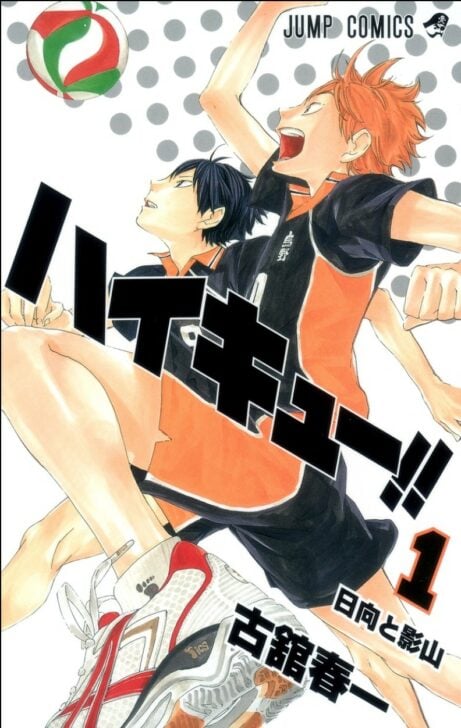
Image by: Haikyu!! Comic 1 ©Haruichi Furudate/Shueisha Inc—
It is also called ‘Haikyu!!'(ハイキュー!!) in the Japanese version. Haikyu means Volleyball in Japanese however the word ‘バレーボール, Barēbōru’ is more commonly used. You write the word ‘Haikyu’ in kanji as ‘排球’, ‘Hai'(排) means to push aside and ‘Kyu'(球) is a ball.

Image by: Haikyu!! Official website ©Haruichi Furudate/Shueisha Inc・Haikyu!! Production committee, MBS
In Japanese culture, names have significant meanings that are supposed to represent you as a person. Names can be expressed in hiragana, katakana, and kanji. Let’s find out the meanings of some names of characters from the Karasuno high school volleyball players!
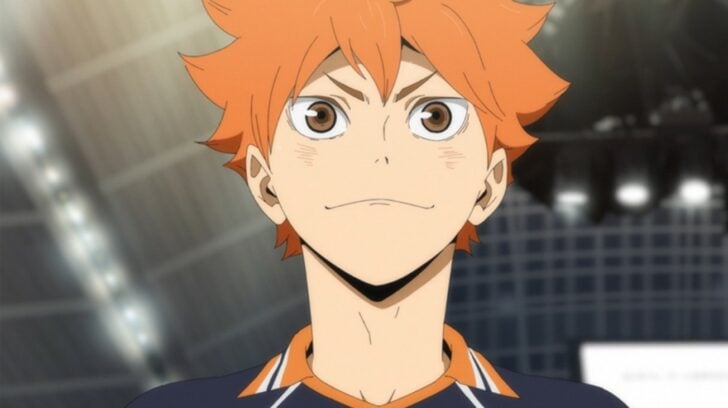
Image by: Haikyu!! Ep9 ©Haruichi Furudate/Shueisha Inc・Haikyu!! Production committee, MBS
Let’s start with the main character of the story Shoyo. He is sadly not gifted in his height but he has incredible stamina and the power to jump. ‘Hi'(日) means sun, ‘Nata'(向) means to face, when you put the two kanji together it becomes ‘Hinata'(日向) the sunny side. ‘Shou'(翔) means to soar, and ‘You'(陽) is sunlight. What an energetic name!
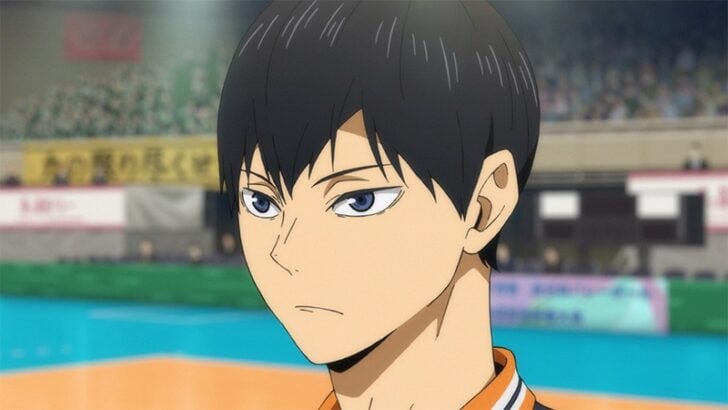
Image by: Haikyu!! Ep9 ©Haruichi Furudate/Shueisha Inc・Haikyu!! Production committee, MBS
Now let’s look into Tobio, the super talented volleyball player with an arrogant and self-centered attitude. ‘Kage'(影) means shadow, ‘Yama'(山) is a mountain, ‘Tobi'(飛) means to fly, and ‘O'(雄) means male and is a common ending for boy’s names.

Image by: Haikyu!! Ep11 ©Haruichi Furudate/Shueisha Inc・Haikyu!! Production committee, MBS
The tallest member of the Karasuno high school. He always keeps his cool and doesn’t really show interest in anything but if you watch him carefully you can tell that he truly enjoys volleyball! ‘Tsuki'(月) means moon, ‘Shima'(島) is an island, and ‘Kei(蛍) is firefly.
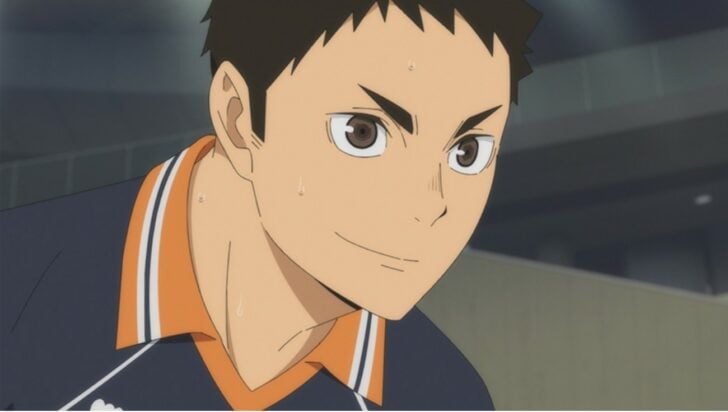
Image by: Haikyu!! Ep11 ©Haruichi Furudate/Shueisha Inc・Haikyu!! Production committee, MBS
Daichi is the captain of the Karasuno high school volleyball club. ‘Sawa'(澤) means swamp and ‘Mura'(村) is a village. His name ‘Daichi'(大地) means earth but when you look at the two kanji individually, ‘Dai'(大) means big and ‘Chi'(地) is ground.
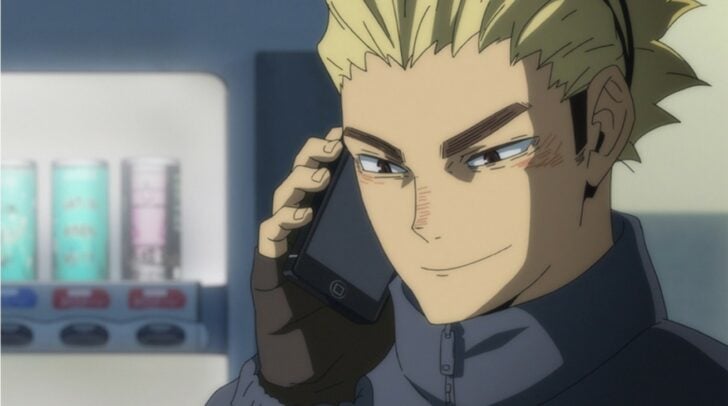
Image by: Haikyu!! Ep3 ©Haruichi Furudate/Shueisha Inc・Haikyu!! Production committee, MBS
Ukai is an alumn of the Karasuno volleyball team and currently the coach. ‘U'(鳥) means bird, ‘Kai'(養) means to feed, ‘Kei'(繋) means to connect, and ‘Shin(心) means heart.
Here are some useful phrases from Haikyu!! that will help you along with your Japanese studies!

Image by: Haikyu!! Comic 42 Ep 366 ©Haruichi Furudate/Shueisha Inc
The word ‘Tomodachi’ means friend and you can replace it with another word to explain that you are cheering on someone else. ‘Kita’(came) is the past tense of ‘kuru’(come). If you use this phrase a lot then you are a very supportive person for sure!

Image by: Haikyu!! Comic 1 Ep 1 ©Haruichi Furudate/Shueisha Inc
‘Mada’ means ‘Yet’, ‘Make’ means ‘Lose’ and ‘Nai’ Means ‘Not’. When people use this phrase they show their resilience. They work hard and never give up.
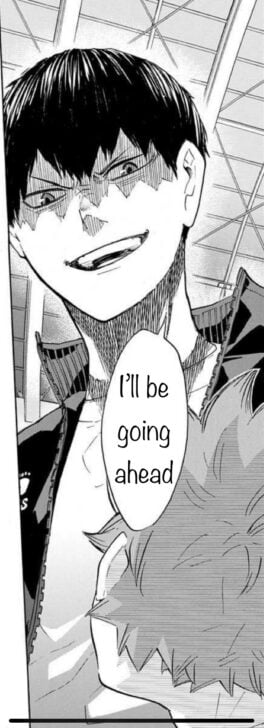
Image by: Haikyu!! Comic 24 Ep 208 ©Haruichi Furudate/Shueisha Inc
‘Saki’ means First or ahead, ‘Ni’ means To, and ‘Iku’ means Go. Boys usually add a ‘Ze’ at the end of the sentence to sound rough or cool.
Sort by Most Kanji Variations
This is the order of names with many variations of kanji.
Basically, names with more variations are more common and familiar to the Japanese.
Sort by Most Viewed
The names are sorted by the number of times they have been viewed on this site. This ranking is based on the behavior of users around the world, including Japan, so it does not mean that the names are commonly viewed by Japanese people only.
Please note that just because a name has been viewed more times does not mean it is a famous name in Japan.
What is Hiragana?
Hiragana is a syllabary used in written Japanese, which originated from the cursive style of Kanji.
What is Katakana?
Katakana is also a Japanese syllabary. Basically, the characters don't have any meaning by themselves, they only represent the sounds.
Japanese try to express the words came from foreign languages with the most similar sounds in Japanese using Katakana.
What is English Transcription?
English Transcription is a term used when translating Japanese names into English. It represents a romanised version of the name with the aim of reproducing the pronunciation as accurately as possible. English Transcription can also be used for name searches.
Japanese Style Nickname
In Japan, nicknames are commonly used to express familiarity and affection. Here are key features and contexts:
Shortened Forms: Names are often shortened for ease and intimacy, such as 'Yuki' from 'Yukiko' or 'Taka' from 'Takashi'.
Suffixes: Terms like 'chan' for girls and 'kun' for boys are added to names among close friends and family. However, 'chan' can also be used for boys during childhood. Additionally, among adults who are very close, like best friends, 'chan' may still be used to convey affection and familiarity. More Details
Usage and Cultural Aspects: Nicknames are typically used in informal settings among friends, family, or close colleagues, and are not suitable for formal or professional environments. The use of a nickname suggests a degree of intimacy and should reflect the nature of the relationship. Young people often demonstrate creativity in their social interactions by crafting unique nicknames.
Note: In Japanese, the long vowel sound is indicated by a special character called a "chōonpu" (長音符), which looks like a horizontal dash (ー). This character serves to extend the duration of the vowel sound immediately preceding it. For instance, in the name "あーちゃん" (A-chan), the "あ" (A) is extended, producing a prolonged "ah" sound, similar to the "a" in "father."
Households?
The names are sorted by the number of Japanese households where the surname is used.
The more households there are, the more famous and common the surname is.
About this site's data of last names
